Finding information online is something we do all the time, but it can often feel frustrating. When you search for something on Google, you usually get a long list of links. Clicking through each one to find the answer you need can take forever, especially for more complex questions. This is where AI search engines can make a real difference. These tools understand the meaning behind your questions and give you accurate, easy-to-understand answers without the hassle. Let’s look at why these tools might just be better than Google and explore some of the best options available.
Why Are AI Search Engines Better Than Google?
Google has been our go-to search engine for years. It works well for simple searches because it uses keywords to find matches in its database. For example, if you type “best restaurants near me,” it’ll show links to various restaurant websites, reviews, and maps.

But what happens when your question is more complex? Let’s say you ask, “What’s the best way to prepare for a marathon if I have 3 months?” With Google, you might have to open multiple tabs, read different articles, and piece together the information yourself. It’s time-consuming and can leave you more confused than when you started.

Now imagine asking the same question to an AI search engine. Instead of just matching keywords, the AI understands the context of your query. It could give you a clear, step-by-step plan right away, saving you time and effort. That’s the big difference – AI search engines focus on understanding your question, not just finding words that match.
Testing AI Search Engines vs. Google
To see the difference in action, I tested both Google and some of the most popular AI search engines. Here’s how it went.
I asked the question:
What are some practical and actionable solutions for predicting customer behaviors in international market?- Google: It showed me links to various blogs and websites. While there was a lot of information, I had to click through multiple pages to find recipes that suited my needs👇

- AI Search Engine: In contrast, this AI search engine (I’ll talk about it later: Perplexity) delivered a list of solutions directly, saving me both time and effort.

Then I followed up with, “What is the best one to be applied for SMEs”:

Each time, it instantly updated the results with only the best options for me, along with verified sources for me if I want to check it out.
These tests showed how much easier it is to get relevant, specific answers from AI search engines. So, in general, AI search experience felt like having a personal assistant. It was fast, accurate, and required no extra effort.
Top AI Search Engines to Try
If you’re ready to explore AI search engines, here are some of the best options out there. Each one has unique features to make your search experience smarter and easier.
Nexa AI – Intelligence On Every Device
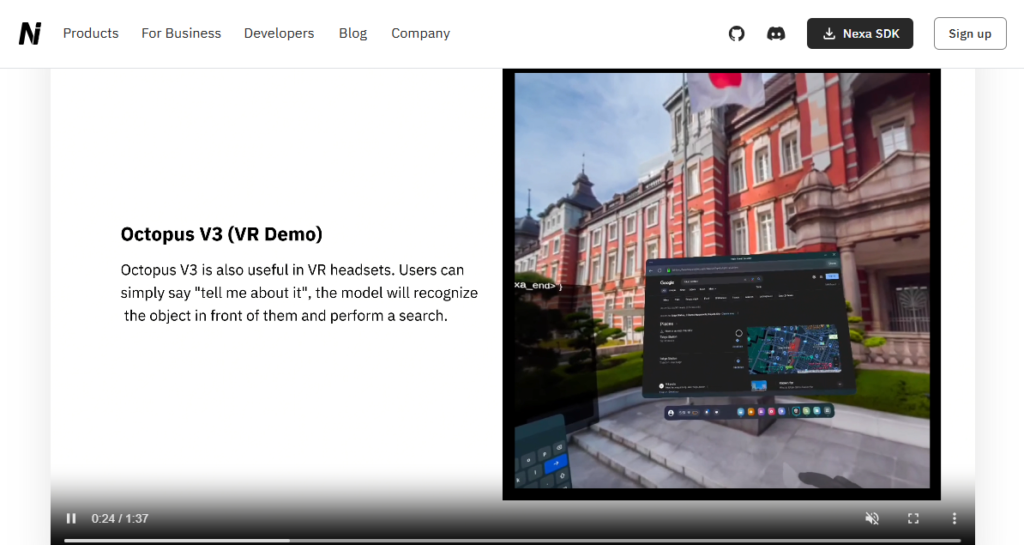
What it does: Nexa AI combines regular web searches with live data from news outlets, blogs, and social media. It’s perfect for staying updated on trending topics or researching subjects that change quickly.
- Pros: Nexa AI gives real-time updates and lets you set alerts for specific topics. It’s great for people who want to stay informed about the latest news or events.
- Cons: Because it collects so much information, it can feel overwhelming. Setting it up may take some time if you’re new to customizable tools.
Exa – The search engine for AI
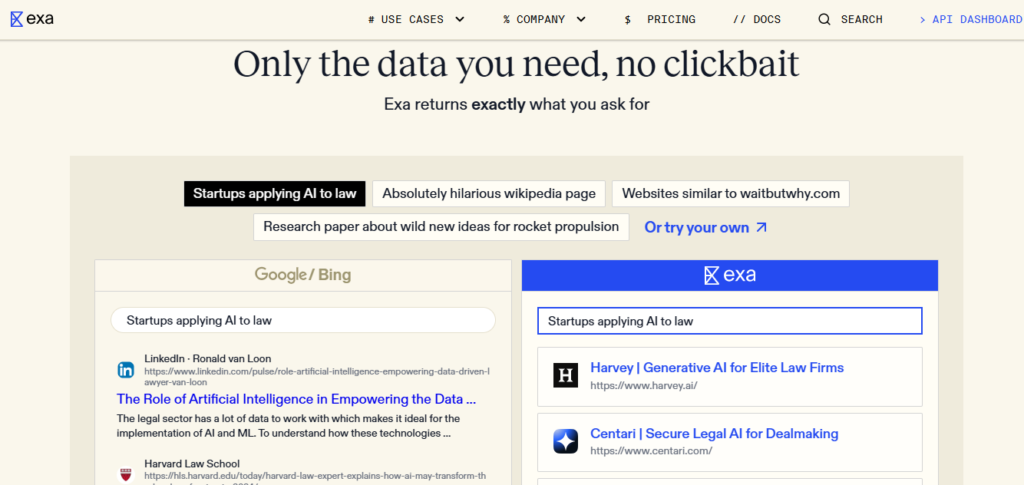
What it does: Exa is another great choice, especially for users who want precise results. It uses advanced technology to deeply understand your query and offers powerful filters to narrow your search. For example, you can focus on specific content types like news articles, blogs, or PDFs. The only catch is that Exa works best when your queries are clear and specific, so it might take some practice to get the hang of it.
- Pros: Exa has powerful filters. You can narrow your results by type (news, blogs, PDFs) or even search within specific categories.
- Cons: To get the most out of Exa, you need to phrase your queries clearly. This might take some getting used to.
Nova AI – Your AI Assistant
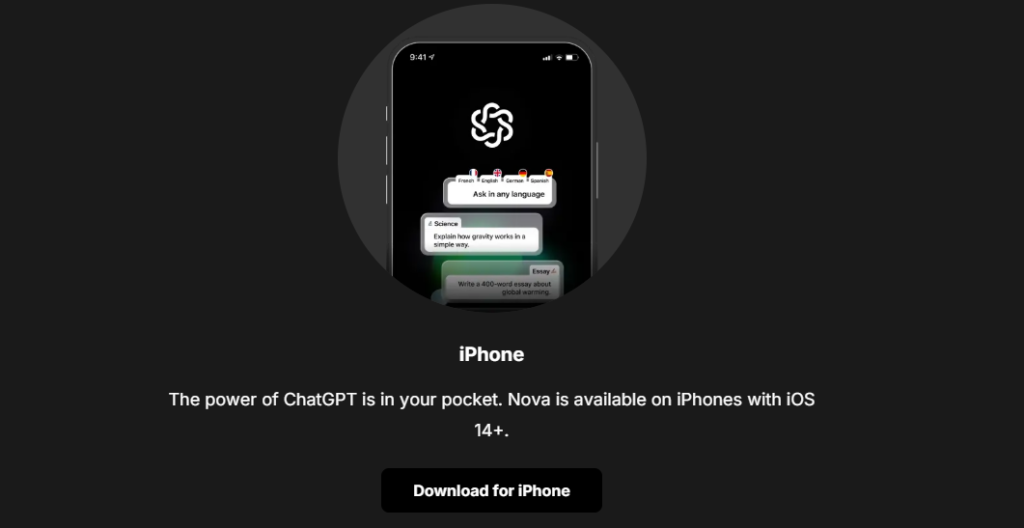
What it does: Nova AI focuses on current trends. It uses machine learning to predict what information you’re most likely to need based on your question.
- Pros: It’s excellent for real-time searches, like breaking news or fast-changing topics. Nova also learns from your past searches to offer personalized suggestions.
- Cons: Its focus on real-time data can sometimes produce too many results, making it harder to sort through them.
Andi AI – AI Search for the Next Generation
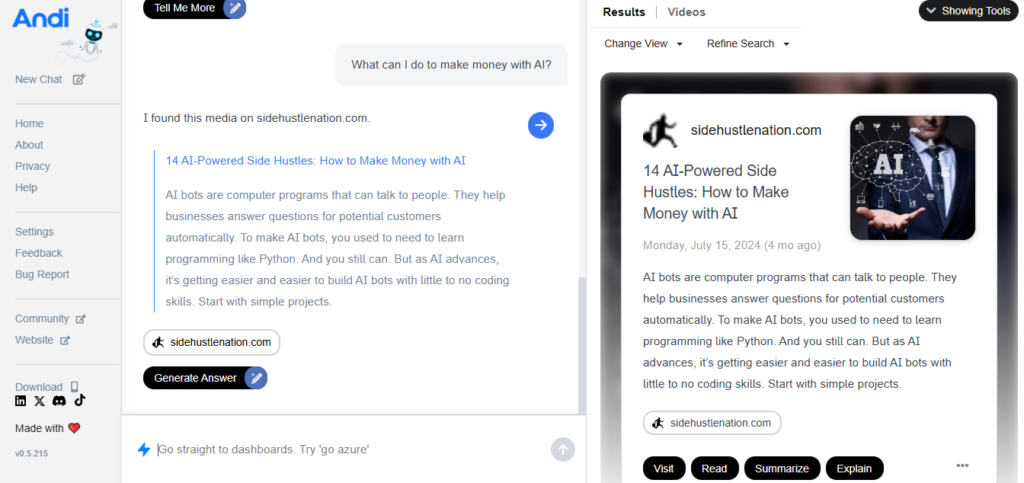
What it does: Andi AI is built with privacy in mind. Unlike many search engines, it doesn’t track your data or store your searches.
- Pros: It’s one of the best options if you’re concerned about online privacy. Andi also summarizes long articles, so you can quickly get the key points.
- Cons: Since it’s still improving, it can be slower than other AI search engines. But the team behind it is working on speeding things up.
Perplexity – AI-powered Answer Engine
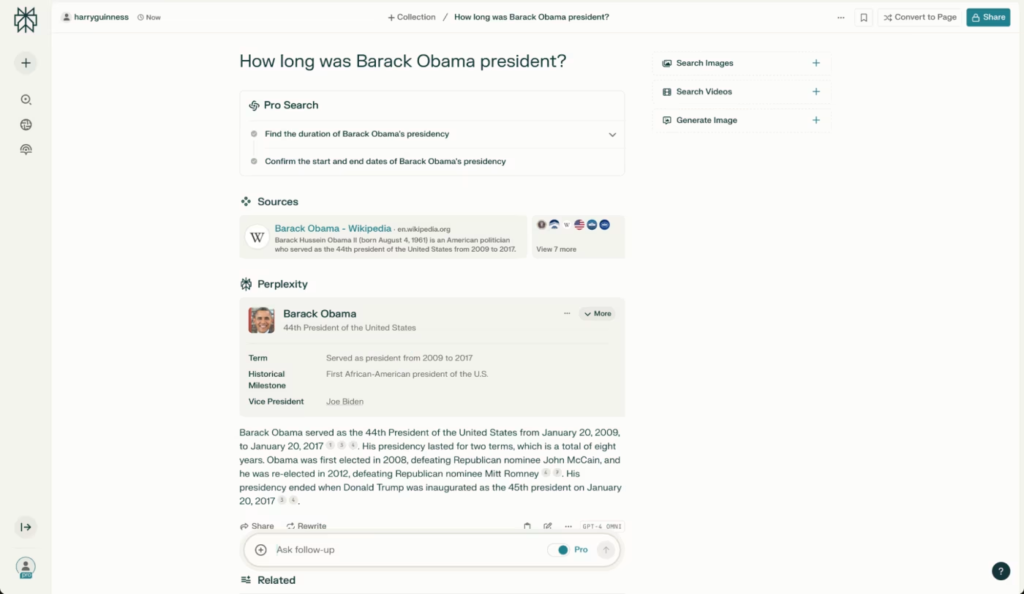
What it does: Perplexity AI works like an AI assistant. It uses advanced technology to search the web and provides answers with references so you can trust its information.
- Pros: It’s incredibly accurate and easy to use, especially for follow-up questions.
- Cons: The free version limits how much you can use it in a day, which might be frustrating if you’re a heavy user.
You AI – AI Search Agent & Customized Recommendations
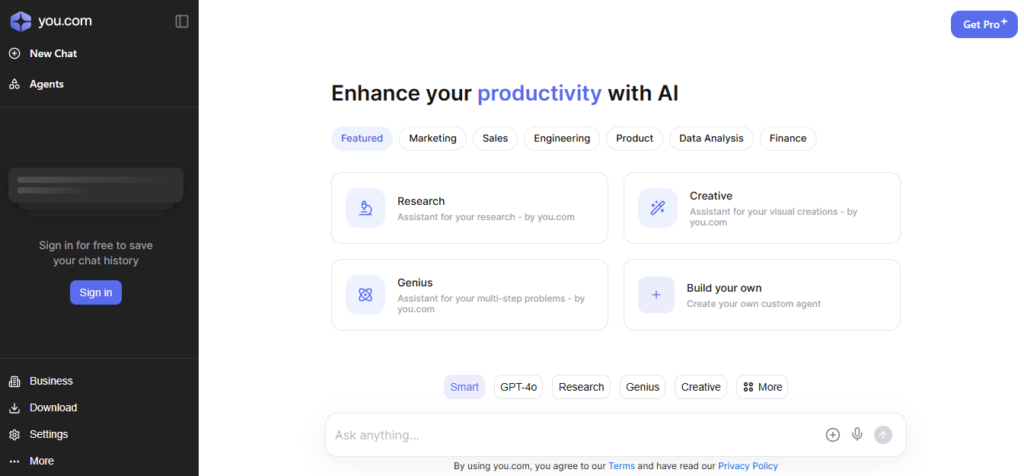
What it does: You AI combines the power of multiple AI models to deliver detailed answers. It also supports voice search, which makes it super convenient.
- Pros: It’s beginner-friendly and remembers the context of your past questions.
- Cons: It may run slower on older devices, as it requires more processing power.
Things to Keep in Mind When Using AI Search Engines
While AI search engines make searching easier, there are a few things to remember to ensure a smooth experience.
- Always verify critical information: These tools are smart, but they’re not perfect. For important topics like medical advice or financial planning, double-check the information from trusted sources.
- Don’t share sensitive data: Avoid typing personal details like passwords or bank information into any search engine, even if it’s AI-powered.
- Learn the basics: Some AI search engines work better if you know how to phrase your questions clearly. Take a little time to understand how each tool works for the best results.
If you’ve ever felt frustrated by endless tabs and irrelevant search results, it’s time to try an AI search engine. These tools aren’t just about finding information; they’re about making the process faster and easier. Whether you’re researching a school project, planning a trip, or looking for dinner ideas, AI search engines can save you time and effort.
Plus, as these tools continue to improve, they’ll become even better at understanding your needs. They’re like having a personal assistant in your pocket, ready to help anytime.
Conclusion
AI search engines are changing how we find information online. Unlike traditional search engines like Google, they understand the context of your questions and provide direct answers, making searches faster and more accurate. All ò the tools I mentioned above, each bring unique features to the table, so there’s an option for everyone.
That said, remember to use them wisely. Verify critical information, protect your privacy, and take time to learn how to phrase your queries for the best results. With these tips, you can enjoy a smoother, smarter search experience.
If you haven’t tried an AI search engine yet, what are you waiting for? Pick one from the list and see how much time and effort you can save. It might just become your new favorite tool for getting things done online.

Muito obrigado!}